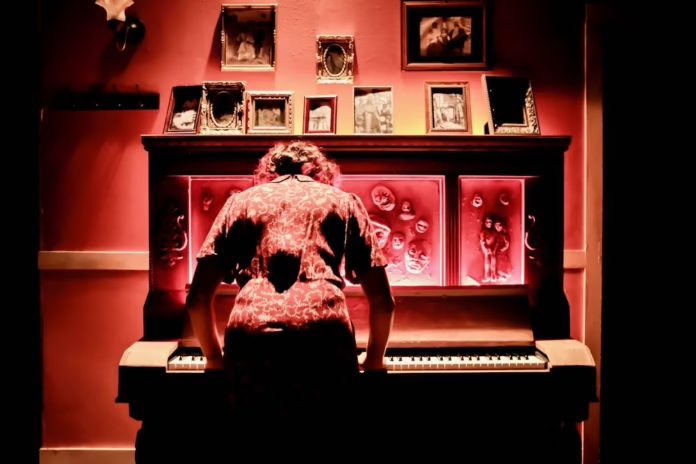According to the American Psychological Institute, the term ‘intergenerational trauma’ did not come into use until the 1960s. So while the clinical concept is foreign to the inhabitants of the mid-1930s that populate August Wilson’s The Piano Lesson, the burden is a lived reality.
Long Beach Playhouse has a cast that gets it right, both the struggle and the joy that can be found in its midst.
Boy Willie (Landon Moss) has come to Pittsburgh with Lymon (Ben Pettis) in a dilapidated flat-bed truck to take from his sister Berniece (Rhyver White) a family heirloom piano whose sale will enable him to purchase a Mississippi farm on which their ancestors were slaves. But she has no interest in letting it go, even though “I don’t play that piano cause I don’t want to wake them spirits.”
Although on the surface this is the central conflict driving the action, it’s what’s going on beneath the surface of The Piano Lesson that drives the characters: trauma not only ancestral and general but also present and idiosyncratic. And also a question (for Black America and beyond): Can we transcend our trauma while holding on to our history?
Spoiler alert: The answer is, We can only hope. But despite being besotted with pithy monologs — an occupational pitfall Wilson he never quite manages to avoid (but that helped him get two Pulitzers, so hey) — the playwright is less interested in answers than examinations. He’s taking us on a journey, giving us a lived experience, how the characters swim with/against the currents of history both unique and shared, how they try and fail and try again, how they push on alone and together.
The show’s standout performance is Landon Moss, if for no other reason than his ability to meet the challenges of a role that encompasses The Piano Lesson’s extremes. When the clouds roll in on Boy Willie, Moss storms, and when they part his light shines on every seat in the house. Heavy as it can be, The Piano Lesson is infused with what Jordan Peele calls “Black joy” — and Moss brings it all.
Although it might have been tempting to rush through long scenes that are little more than people sitting around talking, Jay’s pacing is masterly. A highlight comes in Act One, Scene 2, when Boy Willie, Lymon, Doaker (Keven Benbow), and Wining Boy (Maurice G. Smith) get their drink on and conversate. Midway through Boy Willie is reminiscing about his and Lymon’s time in prison. He starts on a work song, and slowly all four men link their voices and power on, four locomotives dragging heavy freight up a sweltering Mississippi mountainside, each man alone, each part of a common song. It’s a literally show-stopping set piece that also propels an essentially static scene forward by breaking it up.
Meanwhile, a faultless mise-en-scène immerses us in the spacetime of The Piano Lesson — and a few bells and whistles finally brings us into a fifth dimension.
Within the last eight years Long Beach Playhouse has taken three bites at the apple (three apples from the bushel?) that is August Wilson’s ten-play “Pittsburgh Cycle.” Having progressed from 2017’s so-so Fences to 2019’s better Seven Guitars, thoughtful pacing, a synergistic cast, and a commanding lead performance make The Piano Lesson the best of the bunch.
The Piano Lesson at Long Beach Playhouse
Times: Fri–Sat 8:00 p.m., Sun 2:00 p.m. Sunday
The show runs through March 22.
Cost: $20 to $30
Details: (562) 494-1014; LBplayhouse.org
Venue: Long Beach Playhouse, 5021 E. Anaheim St., Long Beach



